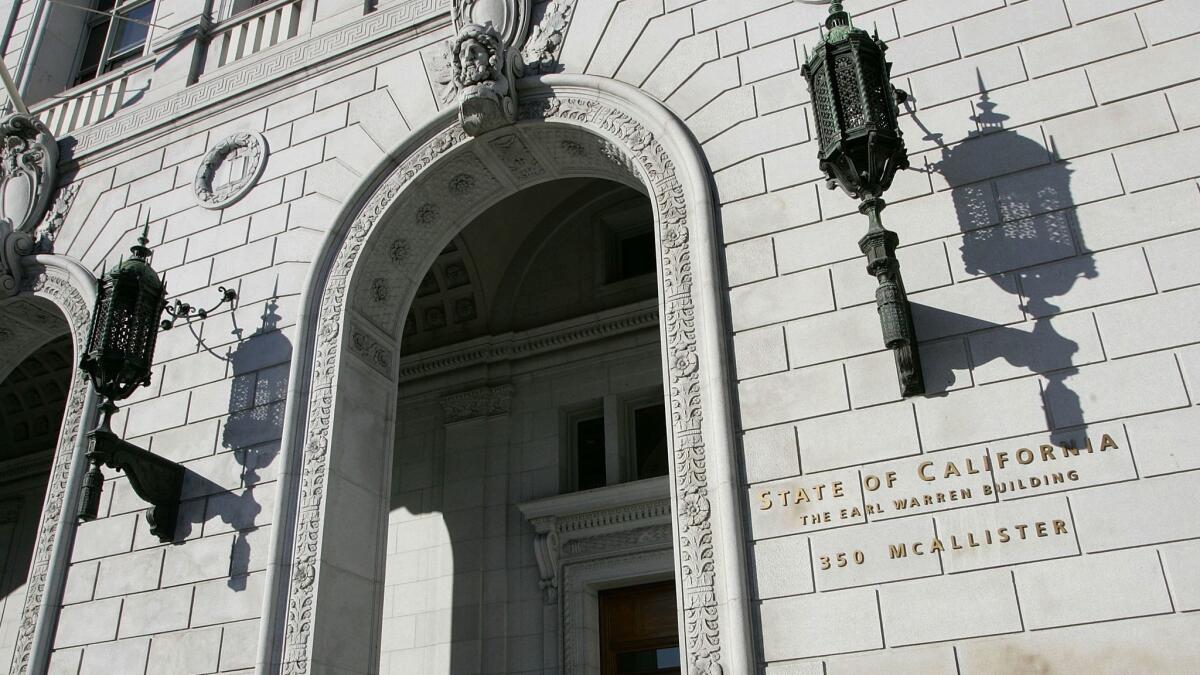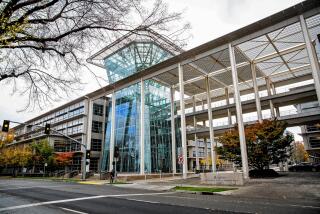California’s top court will review major public pension ruling

The California Supreme Court decided Tuesday to review a ruling that would give state and local governments new authority to cut public employee pensions.
The court, meeting in closed session, unanimously accepted labor unions’ appeal of a decision that said government pensions were not “immutable” and could be trimmed.
But the court will not review further arguments in the case until a court of appeal resolves another pending pension dispute. That could take months.
The case now before the state high court was decided in August by a three-judge panel of the 1st District Court of Appeal in San Francisco.
The other pension case, which raises similar issues, is pending before a different panel of judges in the same court. That panel has not yet scheduled a hearing on it.
The court of appeal’s August ruling amounted to a major change in California pensions law, scholars said.
For decades, California courts have ruled that state and local employees were entitled to the pension that was in place on the day they were hired. Pensions could be cut for current employees only if an equivalent benefit were added, making it difficult for governments to cut costs.
If upheld, the ruling could be a vehicle for reducing a shortfall of hundreds of billions of dollars in public pensions in California. Other states grappling with pension debt also could follow California’s lead.
The court agreed to take the case in a brief order that did not reveal the justices’ thoughts. A decision in the case is likely to be issued in several months.
The ruling stemmed from a pension reform law passed in 2012 by state legislators. The law cut pensions and raised retirement ages for new employees and banned “pension spiking” for existing workers.
Pension spiking has allowed some workers to get larger pensions by inflating their pay during the period in which retirement is based — usually at the end of their careers.
Employees have done this by cashing in years of accumulated vacation or sick pay or volunteering for extra duties just before retirement. The practice in some cases has given employees pensions that exceeded their regular salary.
The Marin County retirement system, relying on the new law, decided that pay for various on-call duties and for waiving health insurance could no longer be counted toward pensions.
Unions objected. They said many employees had been counting on the long-promised benefit and may even have accepted their jobs because of it.
In a ruling written by Justice James A. Richman, appointed by former Gov. Arnold Schwarzenegger, the appeals court said the Legislature can alter pension formulas for active employees and reduce their anticipated retirement benefits.
“While a public employee does have a ‘vested right’ to a pension, that right is only to a ‘reasonable’ pension — not an immutable entitlement to the most optimal formula of calculating the pension,” wrote Richman, joined by Justices J. Anthony Kline and Marla J. Miller, both Gov. Jerry Brown appointees.
A trial judge in the other pension case, brought by employees of Contra Costa, Alameda and Merced counties, upheld the anti-spiking provisions but allowed some employees to count pay for regular and required on-call duties toward their pensions.
Written arguments in that case were completed months ago, and the panel’s failure to schedule a hearing prompted speculation that it was waiting for the California Supreme Court to decide the Marin County dispute before ruling.
Instead, the state high court’s order amounted to a “you go first” message, said Arthur Liou, an attorney who represents unions in both pension cases.
He said the Supreme Court may have decided to wait for a decision in the second case because the justices assumed they would have to review it later anyway.
“Maybe the court wants to hear and resolve all the issues together,” Liou said, noting that both cases raise similar issues.
David P. Mastagni, who represents Alameda County deputy sheriffs in the pending case, said the Supreme Court’s decision to wait for a ruling “really to me signals they understand the gravity and significance of the issues.”
Given the complexity and importance of the dispute, he said, he was not surprised that the court of appeal has yet to schedule a hearing. The court is required to issue a decision within 90 days of a hearing.
David E. Mastagni, the elder lawyer’s son and law partner, said it was not uncommon for the California Supreme Court to postpone a decision until a lower court acts first in a similar case.
“It gives them a more complete record,” he said. “They want to have another fully developed factual background.”
Twitter: @mauradolan
MORE LOCAL NEWS
Appeals court affirms judge’s decision to toss DA off mass-shooter case
San Diego judge who mediated Trump University case praised as ‘steady hand’
More to Read
Start your day right
Sign up for Essential California for news, features and recommendations from the L.A. Times and beyond in your inbox six days a week.
You may occasionally receive promotional content from the Los Angeles Times.







